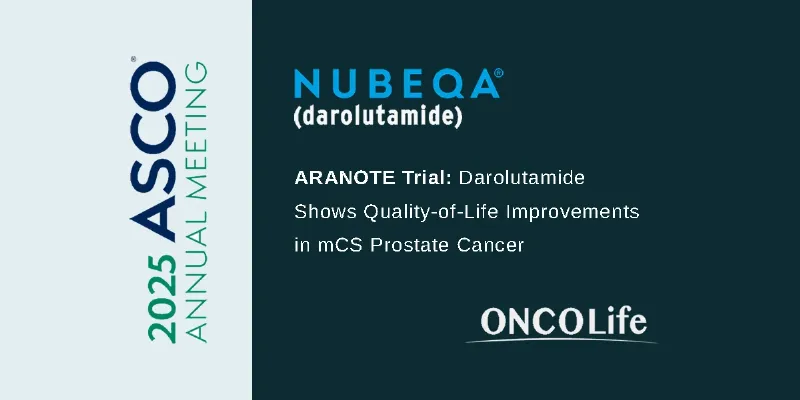Darolutamide Shows Significant Quality-of-Life Improvements in mCS Prostate Cancer

4 June 2025
Presented at ASCO 2025, new post-hoc analyses from the Phase III ARANOTE trial showed that darolutamide (Nubeqa) plus ADT extended the time to HRQoL deterioration by 5.1 months and delayed pain progression in patients with mCSPC, with improvements observed in social/family and functional well-being.
Bayer announced new post-hoc analyses from the Phase III ARANOTE trial, showing that darolutamide (Nubeqa) plus androgen deprivation therapy (ADT) improved health-related quality of life (HRQoL) and pain outcomes in patients with metastatic castration-sensitive prostate cancer (mCSPC). Presented at the 2025 American Society of Clinical Oncology (ASCO) Annual Meeting, these data highlight darolutamide’s ability to extend radiographic progression-free survival (rPFS) and meaningfully delay deterioration in key patient-reported outcomes.
The ARANOTE trial, a randomized, double-blind, placebo-controlled study (NCT04736199), enrolled 669 patients with mCSPC and randomized them 2:1 to receive darolutamide (600 mg twice daily; n=446) or placebo (n=223), both in combination with standard ADT. While the primary endpoint was rPFS, which showed a 46% reduction in the risk of radiologic progression or death (HR 0.54; 95% CI: 0.41–0.71; p<0.0001), these post-hoc analyses provide a more nuanced view of the therapy’s broader benefits.
Specifically, treatment with darolutamide plus ADT resulted in a 5.1-month extension in time to deterioration of the Functional Assessment of Cancer Therapy–Prostate (FACT-P) total score compared to placebo (median 16.6 vs 11.5 months; HR 0.76, 95% CI: 0.61–0.93). This finding is particularly relevant, as FACT-P encompasses multiple domains of well-being, including physical, social/family, emotional, and functional aspects.
“These results from the ARANOTE trial highlight the potential of darolutamide to not only extend radiographic PFS for patients with mCSPC, but to do so while creating clinically meaningful delays in deterioration of quality of life compared to ADT alone. The ability to maintain social, family, and functional well-being, along with managing urinary symptoms and delaying pain progression, are important to patients with mCSPC," said Dr. Alicia K. Morgans, Dana-Farber Cancer Institute.
Further post-hoc analyses revealed that the delay in HRQoL deterioration was driven by significant extensions in time to deterioration across several subscales:
- Social and family well-being (HR 0.79, 95% CI: 0.64–0.98),
- Functional well-being (HR 0.78, 95% CI: 0.63–0.96),
- Urinary symptoms (HR 0.78, 95% CI: 0.61–0.99).
Pain progression, as assessed by the Brief Pain Inventory–Short Form (BPI-SF), was also notably delayed (HR 0.72, 95% CI: 0.54–0.96), with pain progression defined as a ≥2-point increase in worst pain score at two consecutive evaluations or initiation of opioid use for ≥7 consecutive days.
Safety Profile
Importantly, the safety profile of darolutamide plus ADT remained consistent with previous reports, with similar incidences of treatment-emergent adverse events compared to the placebo group. This reinforces the agent’s tolerability in the mCSPC setting.
Darolutamide, a structurally distinct androgen receptor inhibitor, works by competitively inhibiting androgen binding and AR nuclear translocation, disrupting AR-mediated transcription. Already approved in the U.S. for metastatic hormone-sensitive prostate cancer (mHSPC) in combination with docetaxel, as well as non-mCRPC, darolutamide is jointly developed by Bayer and Orion Corporation.
Christine Roth, Executive Vice President, Global Product Strategy and Commercialization at Bayer, emphasized, “These findings underscore the ability of NUBEQA to extend radiographic progression free survival and support quality of life for patients facing mCSPC. These results reflect our unwavering commitment to redefining prostate cancer care and enhancing patient outcomes at various stages of the disease. By focusing on innovative therapies that address the comprehensive needs of cancer patients, we aim to improve their overall treatment experience."
Prostate cancer remains the second most common cancer in men globally, with mCSPC representing a significant clinical challenge. Despite advances, only around 30% of men with mCSPC will survive five years or more after diagnosis, with most ultimately progressing to the more resistant mCRPC stage.











Comments
No Comments Yet!